Really looking forward to attending #infoplus2023 next week!
I'll be giving a talk on Thursday about feminist theory & visualization memes titled "Yes, Yes in Yellow: Memes and What They Tell Us About (Queer) Use of Data Visualization"!
Assistant Professor in CS at Mount Holyoke College; PhD from UMass Amherst
I study and teach how to make data visualizations & computers work for real people.
🏳️🌈
| Website: | https://www.alyxburns.com/ |
Really looking forward to attending #infoplus2023 next week!
I'll be giving a talk on Thursday about feminist theory & visualization memes titled "Yes, Yes in Yellow: Memes and What They Tell Us About (Queer) Use of Data Visualization"!
I'm excited to share our #CHI2023 paper! This was a collaboration with some rockstar undergrads Christiana & Ria, and my great mentors @evanmpeck & Narges Mahyar. It's also the last of the pieces of my dissertation and I'm so excited to see it out in the world. 😁
In it, we're asking: Who is a novice in visualization research, really?
Pre-print here: https://bit.ly/VisNovices
1/n
